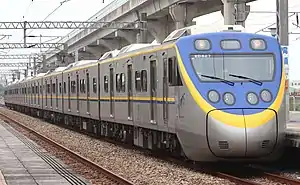EMU800 series
The EMU800 is a series of electric multiple unit train used by the Taiwan Railways Administration (TRA).
| EMU800 series | |
|---|---|
 EMU827/28 at Ciaotou in May 2014 | |
| In service | 2014–present |
| Manufacturer | Nippon Sharyo, TRSC |
| Built at | Toyokawa, Aichi, Japan; Hsinchu, Taiwan |
| Constructed | 2013–2016 |
| Entered service | 2 January 2014 |
| Number built | 344 vehicles (43 sets) |
| Formation | 8-car sets |
| Fleet numbers | EMU801–EMU874, EMU881–EMU892 |
| Operator(s) | Taiwan Railways Administration |
| Specifications | |
| Car body construction | Stainless steel |
| Train length | 165 m (541 ft 4+1⁄16 in) |
| Car length |
|
| Width | 2.89 m (9 ft 5+3⁄4 in) |
| Height |
|
| Doors | 3 pairs per side |
| Wheel diameter | 860–780 mm (34–31 in) (new–worn) |
| Wheelbase | 2.3 m (7 ft 7 in) |
| Maximum speed |
|
| Weight | 319.98 t (314.93 long tons; 352.72 short tons) |
| Traction system | Toshiba COV098-A0 IGBT–C/I |
| Traction motors | 16 × Toshiba SEA-431 220 kW (300 hp) asynchronous 3-phase AC |
| Power output | 3.52 MW (4,720 hp) |
| Acceleration |
|
| Deceleration |
|
| Electric system(s) | 25 kV 60 Hz AC (nominal) from overhead catenary |
| Current collector(s) | Pantograph |
| UIC classification | 2′2′+Bo′Bo′+2′2′+Bo′Bo′+Bo′Bo′+2′2′+Bo′Bo′+2′2′ |
| Bogies | ND-741 |
| Track gauge | 1,067 mm (3 ft 6 in) |
| Notes/references | |
| Sourced from [1][2][3] except where noted | |
Introduction
.jpg.webp)
The EMU800 series was purchased in response to increasing passenger volume and electrification of branch lines, which diverted older commuter EMUs. At 296 cars, the order is the second-largest ever placed by TRA. The first two EMU800 trains were built by Nippon Sharyo, and the remaining 35 were built by the Taiwan Rolling Stock Company from 2013 to 2015. At the beginning there was a dispute over the braking system.[4] After years of negotiation, TRA accepted the proposal and the EMU800 began to service.[5][6]
Features
Unlike previous commuter EMUs, the EMU800 features a fully streamlined nose. Its yellow-and-blue paint scheme has earned it the nickname "smiling train" (微笑號) due to the way the stripe is painted on. The trainsets also have a top speed of 130 km/h (81 mph), compared to 110 km/h (68 mph) for all other commuter stock.[7]
The EMU800 is also the first to have bicycle racks, installed in each of the end cars. Another feature new to the 800 is displays inside the cabin to broadcast messages. The EMU800 is meant to displace older locomotive-hauled trains and the older EMU500 on main line services.[8]
In 2016, the TRA purchased six additional trains. The colors on these trains are inverted, earning the nickname "minion train" (小小兵號).[9]
Service
EMU800s were introduced into service starting from January 2, 2014. Most trainsets are based out of either Hsinchu or Chiayi on services in the greater Taipei and Kaoshiung areas.
References
- "Commuter EMU, EMU800 series" (in Chinese (Taiwan) and English). Taiwan Rolling Stock Company.
- "Commuter EMU, EMU800 series additional 48 cars" (in Chinese (Taiwan) and English). Taiwan Rolling Stock Company.
- "台湾鉄路管理局(TRA)殿向けEMU800型通勤電車" (in Japanese). Nippon Sharyo.
- Shan, Shelley (June 8, 2013). "TRA mulling accepting settlement in train dispute". Taipei Times. Archived from the original on April 2, 2015. Retrieved March 5, 2015.
- Shan, Shelley (July 31, 2013). "TRA's new trains arrive next month". Taipei Times. Archived from the original on April 2, 2015. Retrieved March 5, 2015.
- "Nippon Sharyo supplies the Taiwan Railways Administration with EMU800 railcars". Asian Public Transport News Channel. April 11, 2014. Archived from the original on April 2, 2015. Retrieved March 5, 2015.
- Shan, Shelley (January 1, 2014). "High-speed commuter train begins, travels 130kph". Taipei Times. Archived from the original on April 2, 2015. Retrieved March 5, 2015.
- Taiwan Railways Administration (December 16, 2013). "Fresh Troops from TRA: EMU800 Commuter Train" (Press release). Archived from the original on January 8, 2015. Retrieved March 5, 2015.
- 黃立翔 (August 19, 2016). "台鐵微笑號變「小小兵」 有人嫌醜也有人愛" (in Chinese (Taiwan)). Liberty Times. Archived from the original on August 13, 2020. Retrieved September 21, 2020.